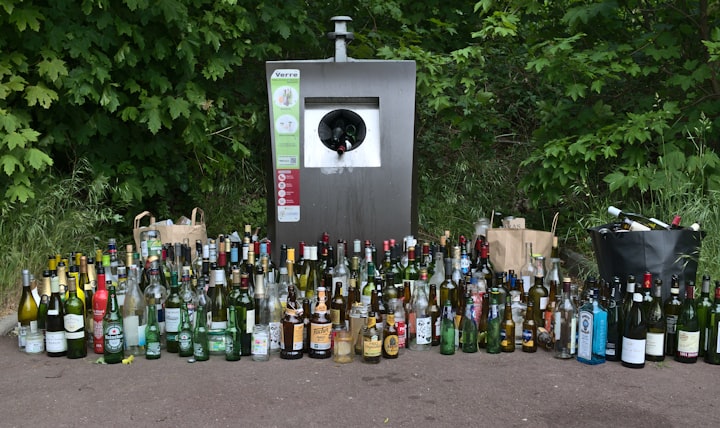The Campaign of Rot
A family moves into a house with a history, and they set about trying to return the property to a beautiful state. However, there's more on the land than just litter.

When I think back to the year when we moved into the house where we found the skeletons, my only memory is the flowers.
To call the backyard wild when we took possession would be too flattering. Wild makes it sound like there was a natural jungle full of potential, when in reality there was just decay and neglect. Someone had tried to turn this backyard into something beautiful, and maybe for a few years they'd succeeded, but now the bench they'd built was broken down the middle, and the fire-pit they'd dug had collapsed in on itself, and a heap of garbage was piled up in the corner. When you saw the gazebo, you couldn't ignore that maybe this could have been an idyllic little slice of paradise once, but those days were gone. The gazebo always smelled foul, and my mother strictly instructed us not to play there.
"Fresh coat of paint, and it won't look half bad," my father said.
"I hate it. It has to go."
"C'mon..."
I've been told about this era many times, but I have almost no memories of my own. I remember the pictures my parents took, and I remember the stories they told, and I remember the grand tour my parents would conduct for any first time visitors: This here? This used to be a fire-pit. And back here there was the garbage heap, remember that? And over here... But for personal knowledge, I had nothing but my memory of the flowers.
We went to the gardening center. Much of the mess had been sorted out, and Mom wanted new plants to brighten up the land. Each of us children got to choose one.
"I like those," I said, pointing to a cluster of flowers with all of the ostentatious glory of a sunset.
"No," my mother said.
"But..." But everyone else had gotten their first choice. There would be daisies and lilies and roses, and most of them would die when the first frost came, but my sunburst flowers were prohibited.
"No," my mother repeated, and we did not argue with my mother.
Years later, when I was old enough to collect and store my memories more carefully, my mother told me her marigold story. When she'd been little, she and all of her siblings had worked in a greenhouse, even though the money they earned always wound up in my grandparents' pockets. My mother primarily worked on tobacco plants--a plant which, in a round-about way, would kill her--but she always dreamed of switching over to those greenhouses that were full of beautiful, sweet-smelling flowers. On the day she got her wish, she found a cluster of marigolds that had been neglected and died in the warm, moist air of the greenhouse. A dozen plants had rotted.
"I can still smell them," my mother said. Her mouth twisted, her eyes shut, and her head rocked back and forth. "That smell..." Other details of working in the greenhouses disgusted me, but my mother would repeat those details without flinching. Only the marigold's elicited raw disgust, and that never faded no matter how many times she repeated the story. I never smelled rotten marigold myself, and I didn't know how to imagine it.
"That smell... oh, it was the worst," she would say. And searching for the scent of a rotten flower, I would imagine an old lady's perfume or the dusty odor of an abandoned building.
We were in the house two years before we found the skeletons. Dad hauled out what remained of the broken bench, and Mom put us to work ripping weeds out of the stony dirt. Fresh soil was layered on top, and we filled whole dumpsters with the yard's garbage. The gazebo overlooked it all.
"Sand it down," my dad recommended, "give it a fresh coat of varnish? I think it could be nice."
"It has to go," my mother said, her voice tinted with the same disgust with which she described rotten marigolds.
"C'mon..." Dad rarely used a pleading, negotiating voice with my mother. Most of the time my parents were as aligned as a two-headed monster. "It'll take more time tearing it down than it would to polish it up. And what's so bad about it? Almost all the boards are still sturdy, the whole thing is kind of beautiful."
And in a way, it was. It looked like a relic while the rest of the yard had looked like junk. I liked to imagine taking cocoa out there with a date, giggling and watching winter stars. It seemed very romantic to me at the time.
My mother wouldn't budge: "It has to go."
So after two years of renovating the house, at which point it was almost unrecognizable compared to the home we first moved into, Dad enlisted me and the siblings to start tearing the gazebo down. He made a fuss, and he expressed its many virtues, but ultimately he caved. My mother stood at the house's backdoor with her arms crossed, like she was watching exterminators remove a wasp's nest.
"What's that stink?" my brother asked after hauling up a board.
"Don't know," Dad said. And then, in a conspiratorial mutter, "If I had my way, we wouldn't be doing this..."
But it came down easily. Sometimes when I think back to it, I think it wanted to come down. Like a child who has just learned a magic trick, it wanted to show us what it was hiding up its sleeve.
"Dad? Do you smell that?"
"Probably a rat or something."
And he wasn't wrong. He just wasn't entirely right. He was a little right, and my mother--who was standing by the back door, smoking her cigarette and watching us do our exterminator's work--was also a little right.
Dad had us disassemble the structure carefully. The last thing he wanted was the gazebo's roof caving in and taking out some of his offspring. But like I said, the gazebo didn't fight back. Nails slid easily from their holes, and screws that looked rusted still glided out of the boards with gentle twists.
And when we finally pried up the boards, the skeletons stared up at us.
"Go back inside," Dad said, but none of us listened.
It took me a long second to realise that I was staring at a skeleton because its face had been crushed. Later a forensic investigator would say that the cause of death was likely a blow delivered to the victim's face from a large, blunt object, like a sledgehammer or the flat end of an ax. Based on the webs of cracks, it likely hadn't been a single blow, but several. When we found the skeleton, half its body was still buried in the soil, as if the bones were reclining on the edge of a hottub. Put a fruity cocktail in one bony hand, and the skeleton would have looked at ease.
"He buried 'em," the same forensic investigator said. "But he didn't bury 'em deep enough. Animals smelled them, did some digging, did some eating."
There was a whole hive of rats. They'd grown fat on the five corpses, and some had died, and they'd rotted too. Breaking open the gazebo's base, the smell was incomparable.
And my mother stood back at the house and watched and fidgeted. When we told her what we found, she didn't look surprised. She just nodded and smoked another cigarette. The previous owner of the house was the most likely suspect, but he'd disappeared shortly after selling, and no one ever knew who the bodies belonged to.
I had nightmares about the family of bones. I had nightmares about being trapped in that gazebo, and I had nightmares about watching as five faceless people were levelled with an ax. But I had the most nightmares about the gazebo. It was beautiful at one point, and I imagined a man going out to the woods with that same ax and chopping down trees. He had to hide the rot somehow, after all. The whole world, every living thing, it was all just a covering for rot. Society was built on deep fields of decay, and gazebos were constructed on mass-graves, and even in a greenhouse the dead things rotted.
When my mother died, I went back to the gardening center. It was still in business twenty years after our first visit. I bought every marigold they had, and I planted them where the gazebo had been, and I carved a placard and turned my marigold patch into a commemorative garden for my mother.
About the Creator
Littlewit Philips
Short stories, movie reviews, and media essays.
Terribly fond of things that go bump in the night.
Enjoyed the story? Support the Creator.
Subscribe for free to receive all their stories in your feed. You could also pledge your support or give them a one-off tip, letting them know you appreciate their work.






Comments
There are no comments for this story
Be the first to respond and start the conversation.